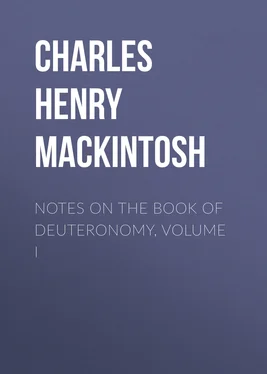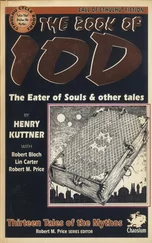Charles Henry Mackintosh - Notes on the Book of Deuteronomy, Volume I
Здесь есть возможность читать онлайн «Charles Henry Mackintosh - Notes on the Book of Deuteronomy, Volume I» — ознакомительный отрывок электронной книги совершенно бесплатно, а после прочтения отрывка купить полную версию. В некоторых случаях можно слушать аудио, скачать через торрент в формате fb2 и присутствует краткое содержание. Жанр: foreign_prose, foreign_antique, на английском языке. Описание произведения, (предисловие) а так же отзывы посетителей доступны на портале библиотеки ЛибКат.
- Название:Notes on the Book of Deuteronomy, Volume I
- Автор:
- Жанр:
- Год:неизвестен
- ISBN:нет данных
- Рейтинг книги:4 / 5. Голосов: 1
-
Избранное:Добавить в избранное
- Отзывы:
-
Ваша оценка:
- 80
- 1
- 2
- 3
- 4
- 5
Notes on the Book of Deuteronomy, Volume I: краткое содержание, описание и аннотация
Предлагаем к чтению аннотацию, описание, краткое содержание или предисловие (зависит от того, что написал сам автор книги «Notes on the Book of Deuteronomy, Volume I»). Если вы не нашли необходимую информацию о книге — напишите в комментариях, мы постараемся отыскать её.
Notes on the Book of Deuteronomy, Volume I — читать онлайн ознакомительный отрывок
Ниже представлен текст книги, разбитый по страницам. Система сохранения места последней прочитанной страницы, позволяет с удобством читать онлайн бесплатно книгу «Notes on the Book of Deuteronomy, Volume I», без необходимости каждый раз заново искать на чём Вы остановились. Поставьте закладку, и сможете в любой момент перейти на страницу, на которой закончили чтение.
Интервал:
Закладка:
And what is the sovereign remedy for this widespread disease? Here it is: Absolute and complete subjection to the authority of holy Scripture . It is not men going to Scripture to get their opinions and their views confirmed; but going to Scripture to get the mind of God as to every thing, and bowing down their whole moral being to divine authority. This is the one pressing need of the day in which our lot is cast—reverent subjection, in all things, to the supreme authority of the Word of God. No doubt, there will be variety in our measure of intelligence, in our apprehension and appreciation of Scripture; but what we specially urge upon all Christians is that condition of soul, that attitude of heart expressed in those precious words of the psalmist, "Thy Word have I hid in mine heart, that I might not sin against Thee." This, we may rest assured, is grateful to the heart of God. "To this man will I look, even to him that is poor and of a contrite spirit, and trembleth at My Word."
Here lies the true secret of moral security. Our knowledge of Scripture may be very limited; but if our reverence for it be profound, we shall be preserved from a thousand errors—a thousand snares. And then there will be steady growth. We shall grow in the knowledge of God, of Christ, and of the written Word; we shall delight to draw from those living and exhaustless depths of holy Scripture, and to range through those green pastures which infinite grace has so freely thrown open to the flock of Christ. Thus shall the divine life be nourished and strengthened; the Word of God will become more and more precious to our souls, and we shall be lead, by the powerful ministry of the Holy Ghost, into the depth, fullness, majesty, and moral glory of holy Scripture. We shall be delivered completely from the withering influences of all mere systems of theology, high, low, or moderate—a most blessed deliverance! We shall be able to tell the advocates of all the schools of divinity under the sun that whatever elements of truth they may have in their systems we have in divine perfectness in the Word of God; not twisted and tortured to make them fit into a system, but in their right place in the wide circle of divine revelation which has its eternal centre in the blessed Person of our Lord and Saviour Jesus Christ.
CHAPTER I
"These be the words which Moses spake unto all Israel on this side Jordan in the wilderness, in the plain over against the Red Sea, between Paran, and Tophel, and Laban, and Hazeroth, and Dizahab. (There are eleven days' journey from Horeb, by the way of Mount Seir, unto Kadesh-barnea.)"
The inspired writer is careful to give us, in the most precise manner, all the bearings of the place in which the words of this book were spoken in the ears of the people. Israel had not yet crossed the Jordan; they were just beside it, and over against the Red Sea where the mighty power of God had been so gloriously displayed nearly forty years before. The whole position is described with a minuteness which shows how thoroughly God entered into every thing that concerned His people. He was interested in all their movements and in all their ways. He kept a faithful record of all their encampments. Their was not a single circumstance connected with them, however trifling, beneath His gracious notice. He attended to every thing. His eye rested continually on that assembly as a whole, and on each member in particular. By day and by night He watched over them. Every stage of their journey was under His immediate and most gracious superintendence. There was nothing, however small, beneath His notice; nothing, however great, beyond His power.
Thus it was with Israel in the wilderness of old, and thus it is with the Church now—the Church as a whole, and each member in particular. A Father's eye rests upon us continually, His everlasting arms are around and underneath us day and night. "He withdraweth not His eyes from the righteous." He counts the hairs of our heads, and enters, with infinite goodness, into every thing that concerns us. He has charged Himself with all our wants and all our cares. He would have us to cast our every care on Him, in the sweet assurance that He careth for us. He most graciously invites us to roll our every burden over on Him, be it great or small.
All this is truly wonderful. It is full of deepest consolation. It is eminently calculated to tranquilize the heart, come what may. The question is, Do we believe it? are our hearts governed by the faith of it? Do we really believe that the almighty Creator and Upholder of all things, who bears up the pillars of the universe, has graciously undertaken to do for us all the journey through? Do we thoroughly believe that "the Possessor of heaven and earth" is our Father? and that He has charged Himself with all our wants from first to last? Is our whole moral being under the commanding power of those words of the inspired apostle, "He that spared not His own Son, but delivered Him up for us all, how shall He not with Him also freely give us all things?" Alas! it is to be feared that we know but little of the power of these grand yet simple truths. We talk about them, we discuss them, we profess them, we give a nominal assent to them; but with all this, we prove, in our daily life—in the actual details of our personal history, how feebly we enter into them. If we truly believed that our God has charged Himself with all our necessities—if we were finding all our springs in Him—if He were a perfect covering for our eyes and a resting-place for our hearts, could we possibly be looking to poor creature-streams, which so speedily dry up and disappoint our hearts? We do not and cannot believe it. It is one thing to hold the theory of the life of faith, and another thing altogether to live that life. We constantly deceive ourselves with the notion that we are living by faith, when in reality we are leaning on some human prop, which sooner or later is sure to give way.
Reader, is it not so? Are we not constantly prone to forsake the Fountain of living waters, and hew out for ourselves broken cisterns, which can hold no water? And yet we speak of living by faith! We profess to be looking only to the living God for the supply of our need, whatever that need may be, when, in point of fact, we are sitting beside some creature-stream and looking for something there. Need we wonder if we are disappointed? How could it possibly be otherwise? Our God will not have us dependent upon aught or any one but Himself. He has, in manifold places in His Word, given us His judgment as to the true character and sure result of all creature-confidence. Take the following most solemn passage from the prophet Jeremiah: "Cursed be the man that trusteth in man, and maketh flesh his arm, and whose heart departeth from the Lord. For he shall be like the heath in the desert, and shall not see when good cometh; but shall inhabit the parched places in the wilderness, in a salt land and not inhabited." And then mark the contrast—"Blessed is the man that trusteth in the Lord, and whose hope the Lord is: for he shall be as a tree planted by the waters, and that spreadeth out her roots by the river, and shall not see when heat cometh, but her leaf shall be green; and shall not be careful in the year of drought, neither shall cease from yielding fruit." (Jer. xvii. 5-8.)
Here we have, in language divinely forcible, clear, and beautiful, both sides of this most weighty subject put before us. Creature-confidence brings a certain curse; it can only issue in barrenness and desolation. God, in very faithfulness, will cause every human stream to dry up—every human prop to give way, in order that we may learn the utter folly of turning away from Him. What figure could be more striking or impressive than those used in the above passage?—"A heath in the desert," "parched places in the wilderness," "a salt land not inhabited." Such are the figures used by the Holy Ghost to illustrate all mere human dependence—all confidence in man.
Читать дальшеИнтервал:
Закладка:
Похожие книги на «Notes on the Book of Deuteronomy, Volume I»
Представляем Вашему вниманию похожие книги на «Notes on the Book of Deuteronomy, Volume I» списком для выбора. Мы отобрали схожую по названию и смыслу литературу в надежде предоставить читателям больше вариантов отыскать новые, интересные, ещё непрочитанные произведения.
Обсуждение, отзывы о книге «Notes on the Book of Deuteronomy, Volume I» и просто собственные мнения читателей. Оставьте ваши комментарии, напишите, что Вы думаете о произведении, его смысле или главных героях. Укажите что конкретно понравилось, а что нет, и почему Вы так считаете.












